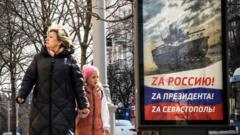
Life Under Occupation: Voices from Russian-Held Ukraine
Since the escalation of the conflict in Ukraine, vast swathes of Ukrainian territory have fallen under Russian control. While the international community focuses on the ongoing military operations, the everyday realities for Ukrainians living in these occupied areas are often overlooked. This report delves into the experiences of civilians residing in Russian-held land, drawing on direct accounts to paint a picture of the challenges, uncertainties, and resilience amidst occupation.
Navigating a New Reality: Adapting to Russian Rule
The imposition of Russian administration has fundamentally altered life for Ukrainians in occupied territories. The introduction of Russian currency, the establishment of new bureaucratic systems, and the replacement of Ukrainian authorities with Russian-backed officials have created a complex and often confusing landscape.
Currency and Economy: A Shift to the Ruble
One of the most immediate changes has been the introduction of the Russian ruble as the primary currency. This transition has presented significant challenges for residents, particularly those reliant on pensions and social benefits previously paid in Ukrainian hryvnia. The fluctuating exchange rates and the difficulty in accessing Ukrainian banking services have exacerbated economic hardship.
Education and Culture: The Pressure to Conform
The educational system has also undergone significant transformation. The curriculum is being revised to align with Russian standards, with an emphasis on Russian history and culture. Ukrainian language and literature are reportedly being marginalized, raising concerns about the preservation of Ukrainian national identity. Pressure is exerted on teachers to adopt the new curriculum, leading to resignations and a shortage of qualified educators. Cultural institutions, such as libraries and museums, face censorship, with materials deemed "anti-Russian" being removed or altered.
Security Concerns and Restrictions on Freedom
The security situation remains precarious in occupied areas. Reports of arbitrary arrests, detentions, and intimidation by Russian forces are common. Freedom of movement is significantly restricted, with checkpoints and curfews hindering daily life.
Movement Restrictions and Checkpoints: Limiting Freedom
The implementation of curfews and the proliferation of checkpoints have drastically limited the freedom of movement for residents. These restrictions make it difficult to access essential services, maintain contact with family and friends in Ukrainian-controlled territory, and pursue employment opportunities. The checkpoints are often staffed by armed soldiers who subject individuals to searches and questioning.
Suppression of Dissent and Freedom of Speech
Any expression of pro-Ukrainian sentiment or dissent is met with swift and often harsh consequences. Social media activity is monitored, and individuals suspected of supporting Ukraine face interrogation and potential detention. Public gatherings and protests are banned, further stifling freedom of expression. The atmosphere of fear and intimidation discourages open criticism of the Russian administration.
Access to Essential Services and Humanitarian Aid
Access to essential services, such as healthcare, water, and electricity, has been severely disrupted in many occupied areas. The breakdown of supply chains and the destruction of infrastructure have made it difficult to deliver humanitarian aid to those in need.
Healthcare Crisis: Shortages of Medicine and Medical Personnel
The healthcare system is facing a severe crisis due to shortages of medicine, medical equipment, and qualified personnel. Many doctors and nurses have fled the occupied territories, leaving hospitals and clinics understaffed and overwhelmed. Access to specialized medical care is particularly challenging, and the delivery of essential medications is often disrupted.
Food Security and Access to Clean Water
Food security is a growing concern, with rising prices and limited availability of essential food items. Supply chains have been disrupted, and many farmers are unable to cultivate their land due to the ongoing conflict. Access to clean water is also a problem in some areas, particularly those that have suffered damage to their water infrastructure. Humanitarian organizations are struggling to deliver aid due to security concerns and logistical challenges.
Resilience and Resistance: Maintaining Hope Amidst Adversity
Despite the difficult circumstances, Ukrainians in occupied territories continue to demonstrate remarkable resilience and resistance. Many are finding creative ways to support each other, preserve their culture, and maintain hope for a future free from occupation.
Community Support and Mutual Aid
Community support networks have emerged to provide assistance to those in need. Neighbors are helping each other with food, shelter, and other essential supplies. Volunteers are organizing activities to support vulnerable individuals and families. These acts of solidarity demonstrate the strength of the Ukrainian spirit.
Preserving Ukrainian Culture and Identity
Efforts are underway to preserve Ukrainian culture and identity in the face of Russian influence. People are secretly celebrating Ukrainian holidays, sharing Ukrainian literature and music, and teaching their children about Ukrainian history and traditions. These acts of cultural resistance serve as a powerful reminder of the enduring Ukrainian identity.
The Future of Occupied Territories: Uncertainty and Hope
The future of the occupied territories remains uncertain. The ongoing conflict and the political complexities surrounding the situation make it difficult to predict the long-term outcome. However, the resilience and determination of the Ukrainian people offer a glimmer of hope that one day, these territories will be liberated and reunited with Ukraine.
```